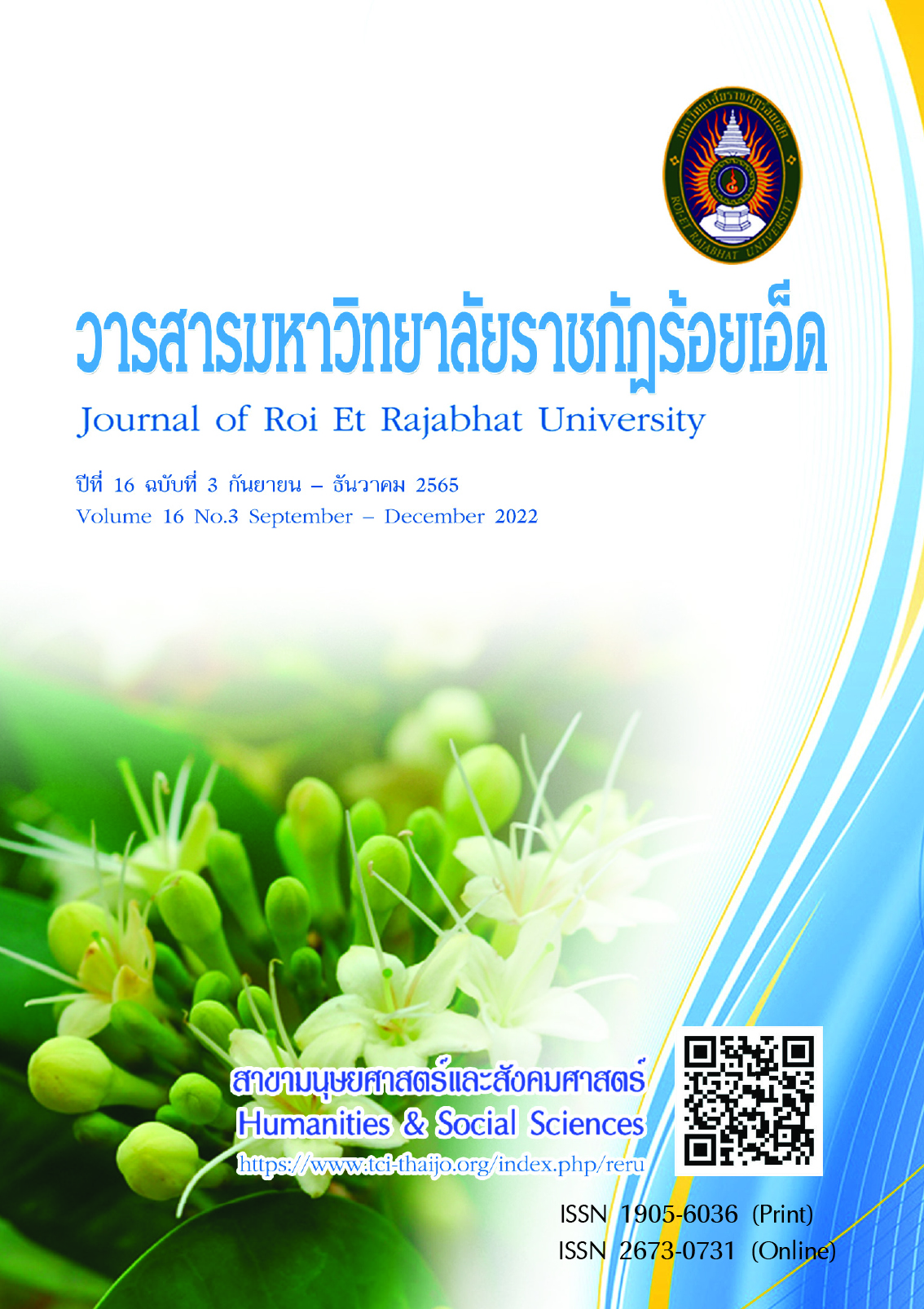An Analysis of Thai EFL Students’ Writing Errors in Argumentative Essays and Satisfaction of Online Collaborative Writing Using Google Docs
Keywords:
Writing errors, Online collaborative writing, Google DocsAbstract
ข้อผิดพลาดในการเขียนคือสิ่งบ่งชี้กระบวนการการเรียนรู้ทางภาษา การช่วยผู้เรียนเรียนรู้ทักษะการเขียน
ได้อย่างสำเร็จนั้น การวิเคราะห์ข้อผิดพลาดเป็นสิ่งสำคัญ การศึกษามีวัตถุประสงค์เพื่อ 1) วิเคราะห์ประเภทข้อผิดพลาดที่พบ
ในการเขียนเชิงโต้แย้งของผู้เรียนชาวไทยด้วยวิธีการเขียนร่วมมือแบบออนไลน์โดยใช้กูเกิลด็อก 2) สำรวจระดับความพึงพอใจของผู้เรียนต่อการเขียนร่วมมือแบบออนไลน์โดยใช้กูเกิลด็อก กลุ่มตัวอย่างงานวิจัย คือ ผู้เรียนสาขาวิชาภาษาอังกฤษชั้นปีที่ 2 จำนวน 32 คน จากการสุ่มตัวอย่างแบบเฉพาะเจาะจง ในวิชาการเขียน 2 เครื่องมือการวิจัย ได้แก่ 1) งานเขียนเชิงโต้แย้ง จำนวน 8 ชิ้น และแบบบันทึกข้อผิดพลาด ปรับมาจาก Norrish (1983) 2) แบบสอบถามมาตราส่วนประมาณค่า 5 ระดับ
3) แบบสัมภาษณ์แบบกึ่งโครงสร้าง สถิติวิเคราะห์ข้อมูล คือ การแจกแจงความถี่ และค่าร้อยละ ผลการวิจัยพบ 346 ข้อผิดพลาดในการเขียนเชิงโต้แย้ง และข้อผิดพลาดมากที่สุด 3 อันดับแรก ได้แก่ ประโยคที่ไม่สมบูรณ์ (14.74%) สะกดคำผิด (13%)
และการเลือกใช้คำ (9.83%) ตามลำดับ ความพึงพอใจของผู้เรียน พบว่า พึงพอใจต่อการเขียนร่วมมือแบบออนไลน์
โดยใช้กูเกิลด็อก ในระดับมาก ( = 3.50) นอกจากนี้มีผลสะท้อนเชิงบวกจากนักเรียน คือ ประโยชน์ในการเขียนจากสถานที่
และเวลาใดก็ได้และเพิ่มแรงจูงใจ ดังนั้นผลการวิจัย ทำให้เกิดความเข้าใจและผู้สอนภาษาอังกฤษในประเทศไทยควรพิจารณาปรับใช้เป็นแนวทางเพื่อสอนการเขียนเชิงโต้แย้งแก่ผู้เรียนต่อไป
References
Alcoy, J. and Biel, L. (2018). Error analysis in written narratives by Thai university students of elementary Spanish as foreign language: Ogigia. Revista Electrónica de Estudios Hispánicos, 24, 19-42.
Ansarimoghaddam, S. and Tan, B. H. (2013). Co-constructing an essay: Collaborative writing in class and on wiki. The Southeast Asian Journal of English Language Studies, 19(1), 35–50.
Bennui, P. (2019). Lexical borrowing in English language tourism magazines in southern Thailand: linguistic features of Thai English words and users’ perspectives. Humanities, Arts and Social Sciences Office, 3(19), 452-502.
Corder, S. P. (1967). The significance of learners’ errors. International Review of Applied Linguistics in Language Teaching, 5(4), 161-170.
Elola, I. and Oskoz, A. (2010). Collaborative writing: Fostering foreign language and writing conventions development. Language Learning & Technology, 14(30), 51-71.
Hinnon, A. (2014). Common errors in English writing and suggested solutions of Thai university students. Journal of Humanities and Social Sciences of Khon Kaen University, 31(2), 166-180.
James, C. (1998). Errors in language learning and use: Exploring error analysis. London: Routledge.
Khatter, S. (2019). An analysis of the most common essay writing errors among EFL Saudi female learners (Majmaah University). Arab World English Journal, 10(3), 264-381.
Kongkaew, S. and Cedar, P. (2018). An analysis of errors in online English writing made by Thai EFL authors. International Journal of Applied Linguistics and English Literature, 7(6), 86-96.
Lightbrown, P. and Spada, N. (1993). How language is learned. New York: Oxford University Press.
Moqimipour, K. and Shahrokhi, M. (2015). The impact of text genre on Iranian intermediate EFL students' writing errors: An error analysis perspective. International Education Studies, 8(3), 122-137.
Mulligan, C. and Garofalo, R. (2011). A collaborative writing approach: Methodology and student assessment. The Language Teacher, 35(3), 5.
Norrish, J. (1983). Language learners and their errors. London: Macmillan Press Ltd.
Oxnevad, S. (2013). 6 Powerful Google Docs Features to Support the Collaborative Writing Process. Retrieved January 2, 2013, from http://www.teslej.org/wordprocess/issues/ volume14/ej55/ej55ml/
Phoocharoensil, S., Moore, B. Gampper, C., Geerson, E., Chaturongkul, P., Sutharoj, S. and Carlon, W. (2016). Grammatical and Lexical Errors in Low-Proficiency Thai Graduate Students’ Writing. Learn Journal: Language Education and Acquisition Research Network, 9(1), 11-24.
Puspita, A. T. and Bayyinah, S. A. (2021). An analysis of students’ grammatical errors in argumentative writing. English Education and Applied Linguistics (EEAL) Journal, 4(1), 1-10.
Roongsitthichai, A., Sriboonruang, D. and Prasongsook, S. (2019). Error Analysis in English Abstracts Written by Vaterinary Students in Northeast Thailand. Chophayom Journal, 30(3), 21-30.
Sermsook, K., Liamnimit, J. and Pochakorn, R. (2017). An Analysis of Errors in Written English Sentences:
A Case Study of Thai EFL Students. English Language Teaching, 10(3), 101-110.
Strobl, C. (2015). Learning to think and write together: Collaborative synthesis writing, supported by a script and a video-based model. In M. Deane & T. Guasch (Eds.), Learning and teaching writing online: Strategies for success. 69–95. BRILL.
Suwantarathip, O. and Wichadee, S. (2014). The effects of collaborative writing activity using Google Docs on students’ writing abilities. Turkish Online Journal of Educational Technology, 13(2), 148-156.
Thresia, F. (2015). An error analysis of argumentative essays (case study at university Muhammadiyah of Metro). Premise Journal of English Education, 2(2), 136-144.
Waelateh, B., Boonsuk, Y., Ambele, E. and Jeharsae, F. (2019). An analysis of the written errors of Thai EFL students’ essay in English. Journal of Humanities and Social Sciences of Prince of Songkla University, 25(3), 55-82.
Watcharapunyawong, S. and Usaha, S. (2013). Thai EFL Students’ Writing Errors in Different Text Types:
The Interference of the First Language. English Language Teaching, 6(1), 67-78.
Wee, R. Sim, J. and Jusoff, K. (2009). Verb-form errors in EAP writing. Educational Research and Review, 5(2), 16-23.
Weigle, S. C. (2002). Assessing writing. Cambridge University Press, 18(2), 219-240.
Wu, H. and Garza, E. (2014). Types and attributes of English writing errors in the EFL contexts-A study of error analysis. Journal of Language Teaching and Research, 5(6), 1256-1262.
Yuwanti, C. M. (2014). Error analysis on the argumentative essays written by the fourth semester students of the study program of English. Sarjana thesis, Universitas Brawijaya. Malang: indonesia.
Downloads
Published
How to Cite
Issue
Section
License
Copyright (c) 2022 Roi Et Rajabhat University

This work is licensed under a Creative Commons Attribution-NonCommercial-NoDerivatives 4.0 International License.
บทความที่ได้รับการตีพิมพ์เป็นลิขสิทธิ์ของวารสารมหาวิทยาลัยราชภัฎร้อยเอ็ด
ข้อความที่ปรากฏในบทความแต่ละเรื่องในวารสารวิชาการเล่มนี้เป็นความคิดเห็นส่วนตัวของผู้เขียนแต่ละท่านไม่เกี่ยวข้องกับมหาวิทยาลัยราชภัฎร้อยเอ็ด และคณาจารย์ท่านอื่นๆในมหาวิทยาลัยฯ แต่อย่างใด ความรับผิดชอบองค์ประกอบทั้งหมดของบทความแต่ละเรื่องเป็นของผู้เขียนแต่ละท่าน หากมีความผิดพลาดใดๆ ผู้เขียนแต่ละท่านจะรับผิดชอบบทความของตนเองแต่ผู้เดียว





